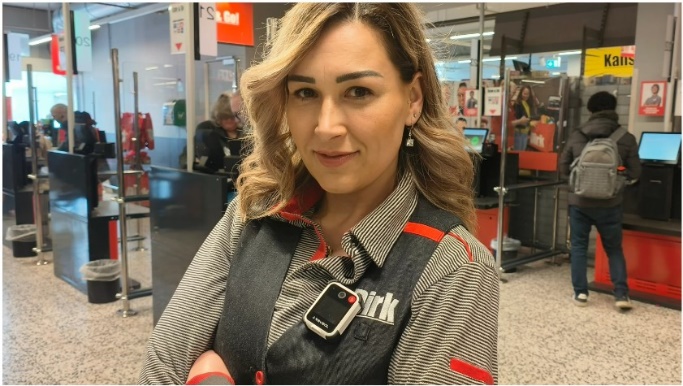Dirk van den Broek is the first supermarket in the Netherlands to introduce bodycams in stores. The Autoriteit Persoonsgegevens is concerned.

Employee with the bodycam. Photo: Dirk van den Broek
Dirk is starting to use bodycams in forty stores. The bodycams will be used in tense or threatening situations.
With this, the small cameras become an additional means of countering unsafe incidents in stores. The goal is to de-escalate, the supermarket chain writes in a press release.
Experiences in the industry (and beyond) would show that the bodycams with screen, which allows a person to be confronted with their own behavior on screen, are de-escalating. And after a successful pilot in 2023, the discount formula is now working with this type of bodycam.
Marcel Huizing, general manager Dirk van den Broek: "As a supermarket we are at the center of society and therefore have a responsibility to customers and our employees. For prevention, we have always used camera surveillance in the stores. For us, the bodycams are an addition on the shop floor to quickly de-escalate threatening situations, because every incident is one too many for our colleagues and customers."
The bodycams work as follows: if an unsafe situation is imminent, one of the trained employees at a Dirk store there can turn on the bodycam. The employee tells the person in question that the bodycam will be turned on.
From that point on, the bodycam records image and sound, but the person in question also sees himself or herself. As with other cameras in the store, images and sound are stored and used only if necessary, for example, for handing over to the police.
Before the introduction of bodycams, the supermarket conducted a Data Protection Impact Assessment (DPIA), the press release states. However, the Autoriteit Persoonsgegevens is critical.
"We normally see bodycams only in police and boas and the use is subject to strict conditions. Camera surveillance is very invasive. That is true of regular cameras hanging on the wall, and it is even more true of bodycams, which film you at very close range, right in your face." quotes the Volkskrant a spokesman for the privacy watchdog.

